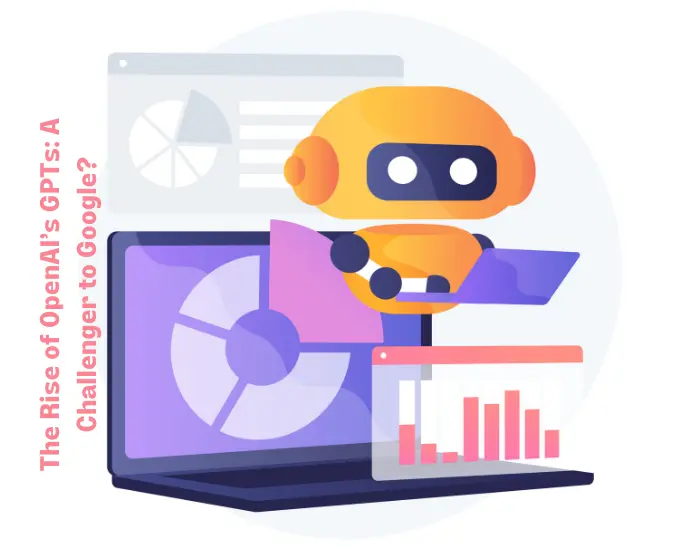Introduction
In the domain of artificial intelligence, one name has consistently stood out: OpenAI. Dubbed “the best chatbot ever made,” it has generated over a million users in its first week, sparking speculation about its potential to replace Google as our go-to search engine.
Before deciding whether OpenAI will replace Google, let’s take a step back and analyze the competition.
Google: The undisputed search king for over two decades, Google has become synonymous with internet research. Its powerful algorithms crawl the web, indexing billions of pages to deliver the most relevant results for your queries.
OpenAI: A research company dedicated to safe and beneficial artificial intelligence, OpenAI has created a series of large language models (LLMs) called GPT (Generative Pre-trained Transformers). ChatGPT, the latest iteration, excels at natural language processing and can generate human-quality texts, translate language, and even write creative content.
Understanding OpenAI's GPTs
OpenAI’s GPTs are a cutting-edge language model that leverages deep learning techniques to understand and produce human-like text. These models are pre-trained on massive datasets, allowing them to learn patterns and nuances in language, enabling them to perform a wide range of language-related tasks. GPT-3 is the third iteration of these models and has 175 billion parameters, making it one of the most powerful language models to date.
Challenging Google's Dominance
Google has long been a player in the AI space, with products like Google Search, Google Translate, and Google Assistant incorporating advanced language processing capabilities.
Versatility of GPTs
OpenAI’s GPTs are designed to be versatile, and capable of handling a large number of tasks with minimal fine-tuning. This versatility is a far cry from the specialized models that Google has traditionally used for specific tasks. GPTs can seamlessly transition between tasks, offering a one-size-fits-all solution that is more adaptable than Google’s targeted models.
Democratizing AI
One of OpenAI’s core missions is to ensure that artificial intelligence benefits all of humanity. By providing public access to its models and APIs, OpenAI aims to democratize AI, allowing developers and businesses to utilize the power of GPTs for various applications. This democratization challenges Google’s more closed approach, where access to certain advanced AI capabilities may be restricted.
Ethical Considerations
OpenAI is at the forefront of addressing ethical concerns related to AI. The organization actively promotes responsible AI development and usage, striving to prevent biases and negative consequences in the deployment of GPTs. This emphasis on ethical considerations sets OpenAI apart and challenges Google to reevaluate its own ethical AI framework.
Collaboration Over Competition
While there is a growing narrative around OpenAI’s GPTs challenging Google, it’s important to note that AI is vast, and collaboration often proves more beneficial than direct competition. OpenAI and Google have both contributed significantly to advancing AI research, and the synergy between these two entities could pave the way for more groundbreaking developments.
So, can GPTs replace Google?
While ChatGPT’s conversational approach to information retrieval offers a refreshing alternative, it faces several critical hurdles:
Limited Scope
Unlike Google’s vast web index, ChatGPT’s knowledge is confined to the data it was trained on. This means it lacks access to the constantly changing online information.
Bias
Like any AI model, GPTs can inherit biases from their training data. This can lead to inaccurate or misleading information, especially on sensitive topics.
Lack of Verification
Google’s search results are ranked based on relevance and credibility, ensuring users receive accurate and reliable information. ChatGPT lacks this level of verification, making it susceptible to misinformation and manipulation.
Monetization
Google’s advertising model is the backbone of its revenue stream. ChatGPT, currently free to use, needs a sustainable monetization strategy to survive and thrive.
Google's Arsenal
Let’s not forget Google’s own arsenal of AI tools. From LaMDA to PaLM, Google is actively researching and developing its own LLMs, posing a significant challenge to OpenAI’s dominance.
The Future of Search
While ChatGPT’s potential is undeniable, it’s unlikely to completely depose Google shortly. Instead, we might see a shift towards a more hybrid approach, where conversational search engines like ChatGPT complement traditional search engines like Google.
Here are Some Possible Scanarios
ChatGPT for Quick Answers
For simple, factual queries, ChatGPT might offer a faster and more convenient solution than traditional search.
Google for In-Depth Search
When comprehensive information is needed, Google’s vast index and advanced algorithms will likely remain the go-to option.
Personalized Search
Both Google and OpenAI can leverage user data to personalize search results, offering a more tailored and relevant experience.
Ultimately, the future of search lies in collaboration and innovation. Both Google and OpenAI, along with other players in the AI space, have the potential to revolutionize the way we interact with information.
The Role of Users
As users, we have the power to shape this future by actively engaging with these technologies and providing feedback. By demanding transparency, accuracy, and ethical development, we can ensure that AI-powered search engines serve our best interests.
Conslusion
OpenAI’s GPTs represent a significant leap forward in the field of artificial intelligence, challenging the norms set by tech giants like Google. The versatility, democratization and ethical considerations inherent in GPTs position them as formidable contenders. While it remains to be seen how this competition will unfold, one thing is certain – the future of AI will be shaped by the collaborative efforts and innovations of organizations like OpenAI and Google.



